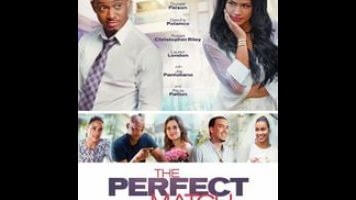The Perfect Match does a strange, hollow imitation of a rom-com

The Perfect Match looks like a romantic comedy: It’s brightly lit and full of attractive people smiling and occasionally sniping at each other. It sounds like a romantic comedy, too, from its generic title down to the way Charlie (Terrence Jenkins) announces “I don’t do relationships” at a chummy dinner with couples who have grown up and found love. Charlie’s lifelong friends Rick (Donald Faison) and Victor (Robert Christopher Riley) attempt to further up the movie’s rom-com bona fides by betting Charlie that if he dates the same woman for the months leading up to Victor’s wedding, he’ll form a romantic attachment.
This bet is made fully within earshot of Eva (Cassie Ventura), the woman Charlie has his eye on, and if Charlie loses, he must only cede the best man speech at Victor’s wedding, something no one seems to care about, cementing this arrangement as perhaps the lowest-stakes wager in the long, sad history of romantic gambling. The bet is mentioned exactly once after this moment; it remains a plot point seemingly only because the filmmakers maintain the faint memory that marketable romantic comedies sometimes hinge on stupid bets. By around the third scene where Charlie engages in halfhearted debate about his refusal to commit, The Perfect Match looks and sounds increasingly like a romantic comedy created out of secondhand memories, vaguely described or poorly translated.
This might have been an interesting strategy if the movie transformed into something more than a hollow imitation of a genre it doesn’t know how to fully inhabit. Instead, it coasts nowhere. Charlie starts to like the sexy and similarly non-committal Eva while suffering from growing dissatisfaction at his job (an “agent” at an organization whose clientele appears to be a muddle of Vine stars, nonspecific divas, randos, and real-life rapper and clear non-actor French Montana), while Victor and Rick deal with their own relationship woes. Faison, as the most easily rattled of the three friends, is occasionally amusing; Jenkins has a presence so breezy and unworried that he seems perpetually in danger of drifting out of frame. Ventura has a similarly mild appeal, which makes them both an odd fit for worked-up softcore sex scenes, possibly left over from director Bille Woodruff’s last movie.
What little happens between Charlie and Eva doesn’t happen for a while, because the movie spends a lot of time introducing characters—almost a dozen in the first 15 minutes or so. Besides the three couples, there’s a gaggle of Charlie’s coworkers and clients, plus his therapist sister Sherry (Paula Patton, dropping into the movie and turning on the charm as if performing a favor to a community theater group). These poor actors are given lines that range from robotic (“I’ll admit, I’m intrigued by your situation”) to grammatically awkward (“whose name are on your checks?”).
Little of this is funny and less of it is funny on purpose. One of the movie’s biggest and least intentional laughs comes from the way one bad turn—to the movie’s credit, a genuinely unexpected plot twist—has Charlie immediately descending into desiccated alcoholism. This is purported to have something to do with the offscreen, years-earlier death of Charlie’s parents, subject of one of the movie’s other big, accidental laughs when Sherry announces in her first scene, “By the way, I’m going to mom and dad’s grave on Sunday.” (That’s how Sherry and Charlie always refer to it: never the cemetery, always the grave.) As with its puzzling treatment of genre conventions, The Perfect Match knows that parents dying is a sad thing that happens, but doesn’t seem to have any understanding of such an event beyond its function as an abstract plot convenience.
This—a plot twist, dead parents, Charlie suddenly hitting rock bottom—is how The Perfect Match manages to steer itself far away from rom-com territory. It turns out this is a movie about Charlie finding himself, and Jenkins is far from equipped to take audiences on this emotional journey. Even a great performance, though, would be working for little reward. Plenty of romantic comedies lack any demonstrable knowledge of actual human behavior. The Perfect Match lacks any demonstrable knowledge of movie behavior, too.